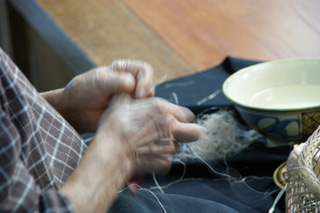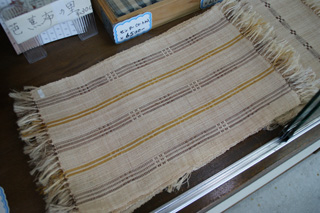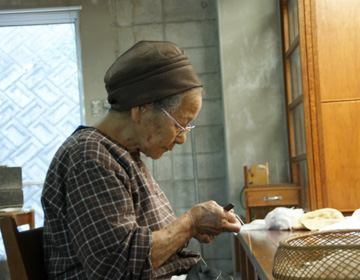 |
Dyeing with plants of the islandOkinawa has a subtropical climate and has abundant plants that can be used for dyeing clothes. Color can vary depending on the quality of water in the area, therefore several types of dyed clothes, such as Ryukyu Kasuri, Kumejima Tsumugi, Miyako jofu, Yaeyama jo fu and minsa, developed. It is said that Basho-fu was already being made around the 13th century, and it was designated as Important Intangible Cultural Property in 1974. It is so beautiful that it received a comment from Soetsu Yanagi, ”It would be very difficult to find cloths more beautiful than this. (from Basho fu Monogatari)” Basho-fu is made from fibers collected from Basho plants, which are often planted in gardens and fields, The cloth woven carefully by hand allows the air to pass through it swiftly, and has been used and loved by people from the era of Ryukyu Kingdom. |
As a creator of Basho-fuWe were allowed to observe the production process of Toshiko Taira, who is recognized as a Living National Treasure in 2006. She was born in Kijioka in Ogimi City, and learned how to make Basho-fu from her mother. After studying under folk art activist Kichinosuke Tonomura in Kurashiki City, Okayama prefecture, she returned to her homeland. She has studied and produced Basho-fu and brought back the techniques which had not been handed down to the next generation. She has dedicated herself to reviving Basho-fu by adding her own artistic style by adding traditional ”tsumugi” and ”aizome” techniques. From her posture of making Basho-fu while keeping the traditional methods, we felt the importance of passing down precious tradition. |
 |
ACCESS
- Ogimi Village Municipal Basho-fu Hall
- Kijoka, Kunigamigun Ogimison, Okinawa
 Discovering Japan [Nihon] through authentic craftsmanship [Honmono]
Discovering Japan [Nihon] through authentic craftsmanship [Honmono]